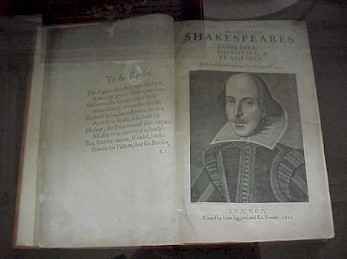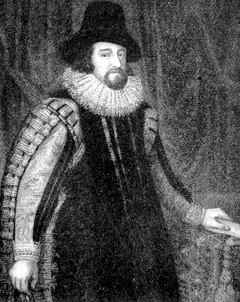|
William Shakespeare You can call him Will, and you can call him Bill, but you doesn't have to call him Francis.
You can call him Will, and you can call him Bill, but you doesn't have to call him Francis. Scholars have advanced more theories about William Shakespeare than about Jesus Christ. For some reason, the Bard of Avon just inspires rampant speculation, regarding both his body of work, whether that work was any good, who actually wrote it, what sort of clothes whoever was wearing when he wrote the works, and the perennial question: What was he smoking? (Whoever he was.) (Unless he was a she.) Shakespeare's father was a glove-maker and later a local politician. His mother was affluent. Young William was born in 1564, in Stratford-on-Avon, England. If you're looking for brilliant insight into how a childhood shapes an artistic career, look elsewhere. The 16th century isn't known for its exhaustive record-keeping. There were no blogs to record the inane details of William's upbringing. At some point during his youth, it is safe to say, Shakespeare got a pretty good education. In addition to his obvious language skills, his plays show a deep knowledge of history and classical literature, much of which he shamelessly stole for material. As a young man, Shakespeare did something or other. The interregnum between youth and adulthood has been the subject of much speculation, due to the utter lack of records that indicate where he was or what he was doing. At age 18, he married Anne Hathaway, a farmer's daughter, and they had at least three children. Then, he simply pops up in London several years later. Some have speculated that the young bard was a poacher, who fled Stratford for London to avoid prosecution. He may also have been kidnapped by aliens, or perhaps he went on an excellent adventure through time to assist some lovable scamps with their high school history project. Whatever he did, it didn't involve record keeping, which means he was very likely making gloves. Whatever he had been up to, Shakespeare took up a full-time career in the theater at the age of 30. He had written his first plays a few years earlier, and his work won him a spot with the Lord Chamberlain's Men in London as an actor and playwright. A few years later, the company was taken over by the King and renamed (rather imaginatively) The King's Men. He may have been a failure as a poacher, but Shakespeare found success in the theater, earning enough money to live in relative comfort. He was amazingly prolific, but also extremely skilled. Over the course of his career, he wrote 37 plays. About a third of his plays were brilliant, another third were quite competent, and the remaining plays were... well... remaining. And we're not talking one-man shows, one-act experiments or improv scenarios. These are five-act plays, and they are long. At times, excruciatingly so. Even more impressive, relative to a modern Hollywood screenplay, Shakespeare's works were written in strict iambic pentameter, after the custom of the time. Each line contained five sets of two beats, with the second beat receiving emphasis. You don't hear the meter in modern performances of Shakespeare, but it's there. You can argue the merits of writing in iambic pentameter, but one fact is inescapable—it's really hard. The amount of work involved in writing any one Shakespeare play is probably the equivalent of writing three or four modern plays. Shakespeare's plays fell into four major categories—comedy, tragedy, history and The Tempest. His comedies tend toward mistaken identity and farce, often with depressingly predictable results. Two Gentlemen From Verona, The Taming of the Shrew, A Comedy of Errors and The Merchant of Venice were among the bright spots in this portfolio, the equivalent of Frasier from our modern world. Most of the remaining comedies, with a few exceptions, were the equivalent of Three's Company, resting on broad slapstick, miscommunications and the lowest form of humor, puns. An exception is A Midsummer Night's Dream, which is more of a Coen Brothers movie. The tragedies were in many ways more successful, including Macbeth, King Lear, Othello, Antony and Cleopatra and perhaps most famously, Hamlet. The latter play in particular has endured as an example of revisionism gone amuck, with everyone from Sir Laurence Olivier to Mel Gibson assailing the role in an attempt to put their own spins on the Big Question: "What the fuck was Hamlet's problem?"
Killing Claudius would seem to be a no-brainer. Instead, Hamlet agonizes over the decision to the point that audiences just want to scream in dismay. Hamlet concocts elaborate schemes to figure out whether his father's ghost was telling the truth, he feigns madness for no apparent reason, and even then he dithers and dallies until Claudius accidentally poisons Hamlet's mother. Hamlet only ends up killing Claudius in the play's closing moments, almost as an afterthought. This inexplicable hesitation on the part of Hamlet has inspired millions of pages of analysis and interpretation, with various theories proposed to explain the melancholy Dane's stubborn refusal to get on with the killing. Far too many term papers have examined Hamlet's Oedipal attachment to his mother. Others have dwelt on the prince's existential dilemma, his clinical depression, his political position, and the lack of fiber in his diet. T. S. Eliot famously wrote that the reason Hamlet takes so long completing his mission is that Hamlet really isn't a very good play. In 1922, Eliot observed that "few critics have even admitted that Hamlet the play is the primary problem, and Hamlet the character only secondary. And Hamlet the character has had an especial temptation for that most dangerous type of critic: the critic with a mind which is naturally of the creative order, but which through some weakness in creative power exercises itself in criticism instead." Which, on the face of it, sounds pretty reasonable. Shakespeare's histories were less problematic and more formulaic. Although many of the tragedies have historical settings, the histories are a series of plays chronicling the intrigues of the kings of England. The personal dramas laid out therein are sufficiently compelling that you don't have to be English to appreciate them. (But it helps.) The Tempest stands apart from the body of Shakespeare's work for its sheer hallucinogenic fun. Written late in the Bard's career, the play is a dreamlike fantasy set on a mystical island. Surreal and full of complex layers, the play was centuries ahead of its time.
Some of them may be telling, such as the sonnets devoted to extolling his love for a male, and the sonnets about an ugly woman whom he found irresistible. But it's always risky to extrapolate facts about an artist's real life from his or her work, especially poets, and especially poets who have been dead for centuries. Nevertheless, Shakespeare's life and his works are favorite subjects for interpretation, much of it mandated in high school and college literature classes. Was he gay? Was he a transvestite? Did have have affairs? How many affairs? Did he do drugs? Most of these questions are destined to be the subject of endless speculation by historians "with a mind which is naturally of the creative order, but which through some weakness in creative power exercises itself in" history instead. However, the issue of whether Shakespeare did drugs is not quite so speculative. Unlike most claims about the Bard's life, there is actual evidence to support a conclusion. In 2001, the South African Journal of Science published the results of an archeological excavation at Shakespeare's home in Stratford, where he retired in 1613. Fragments of clay pipes found on the grounds revealed traces of marijuana, camphor, and cocaine mixed with tobacco. Traces of nutmeg were also found. (It's a hallucinogen, kids! Nog responsibly!) Even with the caveats offered above about reading too much into an artist's output, it's hard not to think of those substances when reading the sonnets: "Why write I still all one, ever the same, / And keep invention in a noted weed, / That every word doth almost tell my name, / Showing their birth, and where they did proceed?"
He probably couldn't have imagined the controversy that would dog his works, however. Not over issues of merit, on which nearly everyone except T. S. Eliot agrees. The dispute, which began not long after his death, had to do with authorship. Who wrote the plays of Shakespeare? The answer would seem to be obvious—Shakespeare! But no, that would be too easy. In the years following the Bard's death, a conspiracy theory of unparalleled proportions sprang up. The charge that Shakespeare was not really the author of Shakespeare's plays first arose in the 19th century. This cottage industry has managed to prosper despite an astounding lack of evidence to even vaguely support the notion. There was definitely a William Shakespeare, he definitely came from Stratford, and plays were definitely published during his lifetime under his name. It's documented that a William Shakespeare was an actor at the theater where Shakespeare's plays also debuted. Some of Shakespeare's signed works were published as early as 1593. Despite all these facts, which are documented at least as well as anything from the 16th century is documented, a virtually unending series of scholars have sublimated their repressed drives into theory after theory, tediously making the case that virtually anyone else alive at the time wrote the plays which have been attributed to William Shakespeare since the day they were first published. Among the usual suspects: Francis Bacon, Christopher Marlowe, Ben Jonson, the Earl of Oxford, and even the Countess of Pembroke, Mary Sidney Herbert. Part of the reason for the confusion is a profusion of Shakespeare forgeries, starting a few minutes after the man's death and continuing to this day. The forgeries include everything from deeds to sonnets to entire plays. There have been so many forgeries and apocryphal writings that it's not even possible to be absolutely certain of the number of plays and sonnets originally belonged to the Bard. (The numbers given above are based on the most conservative view.) Of course, it's great fun to sit around and argue for hours over which 16th century luminary might have written Shakespeare's plays and why, detailing your arguments with extensive citations, semantic analysis and complex anagrams. Indeed, it's hard to imagine what could be funner! Sure, you might be missing out on great sex, great food, sunshine and exercise, but you can rest easy knowing you've wasted years of your life trying to prove a premise that's probably wrong and really not all that important anyway.
Timeline
|
 The problem of Hamlet is pretty simple. His father's ghost appears and orders Hamlet to kill Claudius, his father's brother. Now, Claudius murdered Hamlet's father, married Hamlet's mother and usurped Hamlet's throne. And that was just before the play. During the play, Claudius spies on Hamlet in private moments with his girlfriend, spies on Hamlet's private conversations with his mother, drives Hamlet's girlfriend to suicide, schemes to kill Hamlet, and murders two of Hamlet's friends.
The problem of Hamlet is pretty simple. His father's ghost appears and orders Hamlet to kill Claudius, his father's brother. Now, Claudius murdered Hamlet's father, married Hamlet's mother and usurped Hamlet's throne. And that was just before the play. During the play, Claudius spies on Hamlet in private moments with his girlfriend, spies on Hamlet's private conversations with his mother, drives Hamlet's girlfriend to suicide, schemes to kill Hamlet, and murders two of Hamlet's friends.  In addition to all these plays, Shakespeare also wrote thousands upon thousands of verses of poetry, also in iambic pentameter. Unlike the plays, which were written in blank verse, Shakespeare's sonnets have a strict rhyme scheme as well. Some of Shakespeare's sonnets are touching, others are funny.
In addition to all these plays, Shakespeare also wrote thousands upon thousands of verses of poetry, also in iambic pentameter. Unlike the plays, which were written in blank verse, Shakespeare's sonnets have a strict rhyme scheme as well. Some of Shakespeare's sonnets are touching, others are funny.  Shakespeare died in 1616 at the age of 52, which was fairly respectable for the plague-ridden England of his day. However, the saga of Shakespeare had only just begun. His plays have been performed continuously since his death, which is no small accomplishment in a world often driven by fads.
Shakespeare died in 1616 at the age of 52, which was fairly respectable for the plague-ridden England of his day. However, the saga of Shakespeare had only just begun. His plays have been performed continuously since his death, which is no small accomplishment in a world often driven by fads.